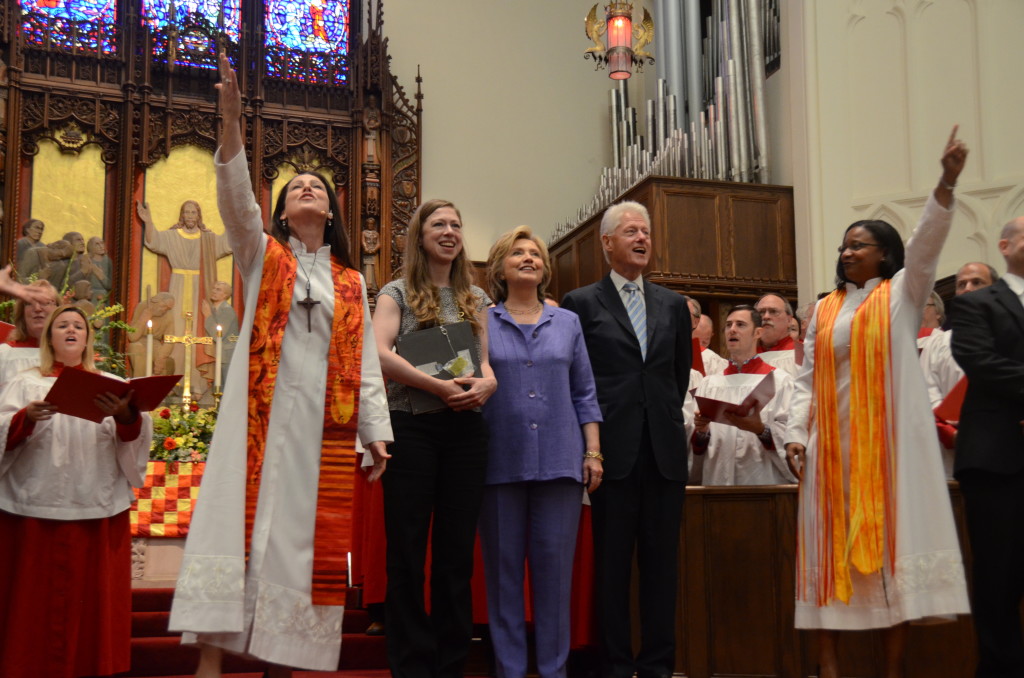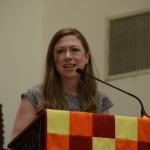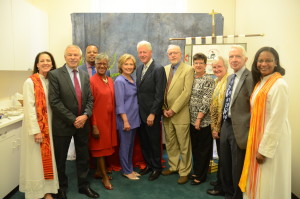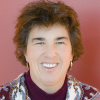Former First Family visits, speaks, at Foundry UMC's 200th Anniversary Celebration
Former First Family visits, speaks, at Foundry UMC’s 200th Anniversary Celebration
[caption id="attachment_49686" align="alignleft" width="600"]
 The Rev. Ginger Gaines-Cirelli, left, Senior Pastor of Foundry UMC in Washington, D.C., offers the benediction during the church's bicentennial homecoming service on Sept. 13. To her left stand Chelsea Clinton, her mother, Hillary Clinton, and her father, former President Bill Clinton. At the far right is the church's Executive Pastor, the Rev. Dawn Hand. Photo by Erik Alsgaard.[/caption]
The Rev. Ginger Gaines-Cirelli, left, Senior Pastor of Foundry UMC in Washington, D.C., offers the benediction during the church's bicentennial homecoming service on Sept. 13. To her left stand Chelsea Clinton, her mother, Hillary Clinton, and her father, former President Bill Clinton. At the far right is the church's Executive Pastor, the Rev. Dawn Hand. Photo by Erik Alsgaard.[/caption]By Erik Alsgaard
If you count all the Senior Ministers that have served Foundry UMC in its 200 year history, the line begins with the Rev. Thomas Burch in 1817. They are all male until 2014, when the Rev. Ginger Gaines-Cirelli was appointed.
But on the Sept. 13 celebration of the church’s 200th anniversary, not one male spoke from the pulpit. In fact, it was two famous Foundry women, Chelsea and Hillary Clinton, who brought the morning’s message.
Clinton, the former First Lady, Secretary of State, Senator from New York and current Democratic candidate for president, told the packed sanctuary that she and Chelsea first came to Foundry on a very snowy Sunday morning in 1993. Before all the heightened security measures that are now in place, she said, she and her daughter simply walked, with Secret Service agents in tow, to the nearest United Methodist church from the White House: Foundry.
“From that moment until this, we have always felt so welcomed,” she said. “This community – for that, indeed, is what it is – was the place where we worshipped, studied, contemplated, a place to be of service, get some good pastoral advice and step outside all the commotion of life in the White House. Here we were not the First Family, we were just our family and we relished and cherished that time.”
The church owes its existence to Henry Foxall who, in the early 1800’s, owned and operated an iron works – a foundry – in Washington. Born in England, Foxall was friends with Francis Asbury, Methodism’s first bishop, and many other prominent Methodists in the newly-minted nation’s capital.
Following the British invasion of 1814, Foxall’s foundry was left unharmed. Giving thanks, he “provided for a new church for Washington Methodists,” according to the church’s history booklet.
Chelsea Clinton spoke briefly about what Foundry meant to her as she grew up in the White House. The church, she said, provided warmth and community for her during those years.
[caption id="attachment_49690" align="alignright" width="150"]
 Chelsea Clinton speaking at Foundry UMC on Sept. 13.[/caption]
Chelsea Clinton speaking at Foundry UMC on Sept. 13.[/caption]“When we moved to Washington,” she said, “I didn’t think I would find a community that could be as nurturing and supportive as what I had in my church in Little Rock. I am so grateful that I could not have been more wrong.”
Chelsea Clinton mentioned the many opportunities the church gave her, not only in ways of learning and growing in the faith, but putting that faith into action.
“Faith has to be humble,” she said, “because of our commitment to works. I am so grateful that through the Youth Group, we not only went on Appalachian Service Project trips, but we did a lot of work right here in Washington, D.C. We could never escape how intimately connected our faith should be, and must be, connected to our works.”
Hillary Clinton recounted her Methodist up-bringing, saying, “I am Methodist by choice and by birth.” She told how her mother taught Sunday School at the Methodist Church, mainly, she guessed, “so my brothers would attend.”
But it was a youth minister in Park Ridge, Illinois, that opened her mind, her eyes and her heart, she said, and who “forced us out of our comfort zone.”
Part of that experience, she said, was going to hear the Rev. Martin Luther King, Jr., in Chicago, and that experience, Clinton said, changed her life.
“In place after place after place,” she said, “the Methodist Church and my fellow Methodists have been a source of support, of honest reflection, and of candid critique – in fact, I got some advice from (former Senior Pastor, the Rev. Dr. Phil) Wogaman just this morning, … who told me to be nicer to the press.”
Citing Romans 12, Clinton spoke on how every person has been given gifts by God. “Everyone has gifts to be recognized and to be celebrated,” she said. This was a lesson she learned from her mother. “No matter who you are, where you come from, what’s your income, your race, your religion, your gender, your age, your ability, you have value, you have dignity, you have something to offer God and the world.”
The Apostle Paul, she said, was very clear that we can’t merely celebrate our gifts, we have to put them into action.
“We should be,” she said, “in Paul’s words, ‘generous and diligent and cheerful in our service.’”
Paul’s letter to the Romans, Clinton said, also carries a particular message and challenge to the nation at this time in our history.
“It’s not enough just use our gifts,” she said. “We also have to make it possible for other people to discover and use their gifts, too.”
The truth is, she continued, that there are too many people in the world who have “so much” to offer but who never have the opportunity to “live up to their God-given potential.”
Noting some of the barriers that hold people back, including race, gender and sexual orientation, Clinton said it is the job of the “village, the community, the church and, yes, a country” to open doors that are still closed. “We can lift each one up and leave no one behind.”
The Rev. Maidstone Mulenga, Assistant to Bishop Marcus Matthew, episcpoal leader of the Baltimore-Washington Conference, represented the bishop at the service. Matthews is currently on a renewal leave.
“We extend our heart-felt congratulations to Foundry on their 200th anniversary,” Mulenga said. “We pray God’s blessings on their past and present, and look forward to what God will accomplish here in the future.”
[caption id="attachment_49683" align="alignleft" width="300"]
 Former President Bill Clinton, center, and his wife, Hillary Clinton, stand with members of the bicentennial committee at Foundry UMC on Sept. 13.[/caption]
Former President Bill Clinton, center, and his wife, Hillary Clinton, stand with members of the bicentennial committee at Foundry UMC on Sept. 13.[/caption]As worship ended and the congregation spilled out into the sun-splashed porch in front of the church, the Rev. Joe Daniels, superintendent of the Greater Washington District, said that it was a “fabulous service for a fabulous church.”
Daniels said that Foundry has done so much in the District of Columbia that it would be hard to list it all. “Foundry has always been on the edge of major issues,” he said when asked what made the church special. “They’ve always been unafraid to live in the tension of most issue that people don’t want to be a part of. They’ve always had an attitude, a DNA, of jumping in to controversy and trying to find ways of healing.”
“The Foundry Team was shining in every way,” said Gaines-Cirelli after it worship ended, noting that this Sunday was the culmination of a 13-month celebration. “We have this amazing history, that we’re standing on the shoulders of all these people who’ve gone before, and I’m excited to be on that firm foundation as we look to the future.”
Gaines-Cirelli said that Foundry, in the future, will stay committed to the issues that Clinton spoke about, especially around LGBTQ inclusion and ending chronic homelessness in D.C. The church has also taken up the mantel, she said, for racial justice.
“That’s a piece that’s going to be increasingly important in our shared life,” she said. “Not only to be an advocate and speak out but to try and intentionally create the beloved community.”
The pastor is hopeful, if not excited, about the future for her church.
“I’m excited,” she said. “I’m clear (the future) is going to be strong and bright and we’re going to continue to change people’s lives and, thereby, change the world, which is our mission.”
At the end of her speech, Clinton thanked Foundry for being the church.
“Our family is just one of so many over the past 200 years that this church has inspired,” she said. “We are proud and grateful to be members of this community.”
Soon after the Clinton’s arrived at Foundry, she said, the church became a Reconciling Community, one that is open to being in ministry with all people regardless of race, gender or sexual identity.
“This only added to our joy of being a part of (Foundry),” she said. “The movement for reconciling goes on. The movement for healing, for reaching out, for loving and serving, will never end.”


Login/Register to leave comment